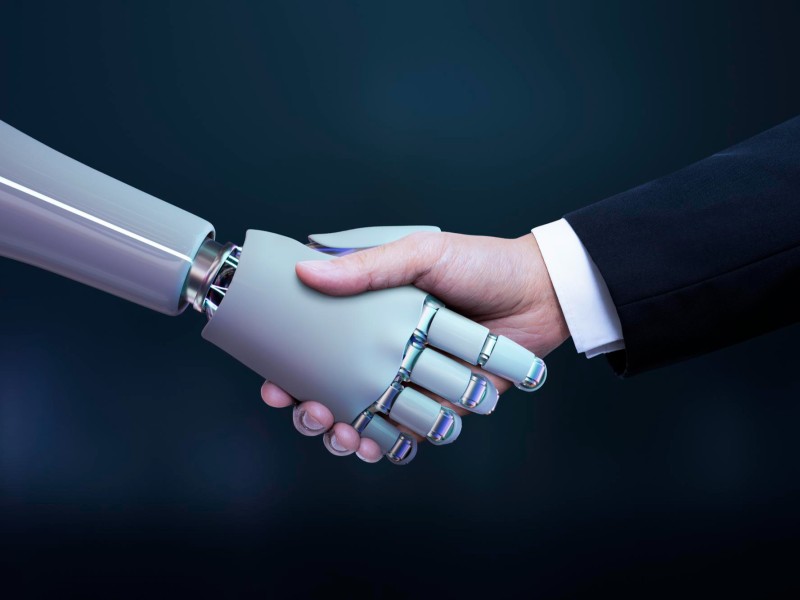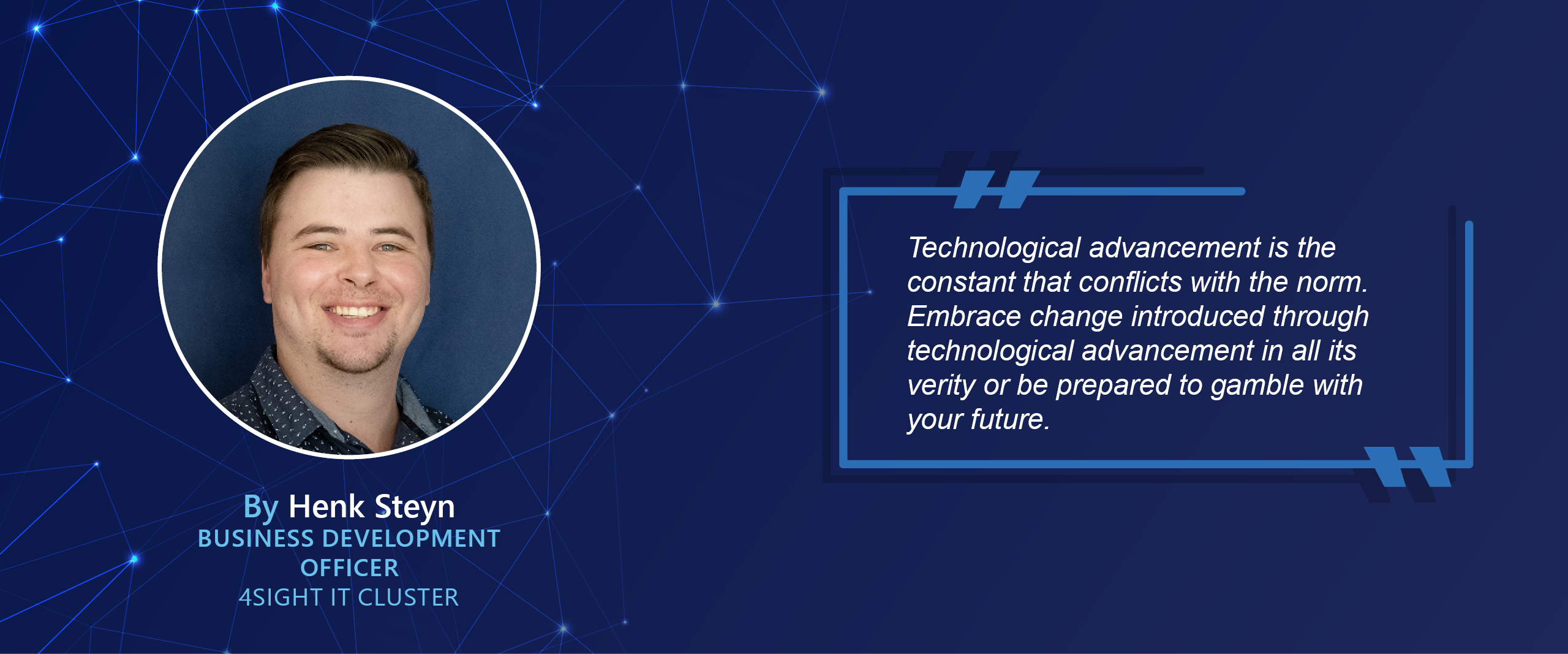Blog - Information Technologies
Humanism & Artificial Intelligence: A Marriage Fit for Advancement, or the Route to Our Downfall?
Shout out to Sage South Africa for providing the feature-rich, highly configurable, ERP platform; a flagship solution called Sage X3 that allows me to future-proof businesses by taking care of all their immediate finance, distribution and manufacturing needs.

I wondered whether my valued customers struggle with these concepts as well, which prompted me to share some of my insights. After a conversation with a family member, I've had some realisations.
I would like to share this powerful quote from the late Abraham Maslow (1908 – 1970), the Father of the Hierarchy of Needs and one of the founders of Humanistic Psychology, a branch of Psychology that predominantly emphasises the study of a whole person and their potential for growth, self-actualisation, and fulfilment: “In any given moment, we have two options: to step forward into growth or to step back into safety.”
With the growing prevalence of (AI) and the integration thereof into the workplace, it is my understanding that sceptics argue against the advancement of AI and the challenges it may introduce, such as:
Ethical Repercussions: The development and deployment of AI raises ethical questions regarding issues such as privacy, fairness, accountability, transparency, and the potential for bias or discrimination in AI systems.
Labour Displacement: Automation enabled by AI has the potential to disrupt labour markets and lead to job displacement, particularly for tasks that are routine or repetitive. This raises concerns about economic inequality and the distribution of benefits and opportunities in society.
Depersonalisation: In some contexts, the reliance on AI-driven systems may lead to a loss of human interaction, empathy, and individual agency, potentially eroding humanistic values related to interpersonal relationships, autonomy, and self-expression.
Coupled with the above, I often find myself thinking, “When will our need for growth, self-actualisation, and fulfillment end? Why are we developing computer systems that could potentially challenge our existence?” Admittedly, I am a bit of a sceptic, but if the world were to end in the likeness of what is portrayed in The Matrix franchise, I’d be OK with it, assuming I’m Neo of course.
Can the continuous evolution of AI not just be the next step in our growth cycle as a species? I’d like to believe that (AI), which many believe to be against the philosophy of Humanism, is not a threat, but rather a construct, that if managed appropriately, will complement, and align with our humanistic values in several ways.
Theoretical Context:
For context, Humanism is not necessarily a direct contrast to Artificial Intelligence, rather it emphasises the inherent dignity, worth, and potential of human beings, advocating for the fulfilment of human needs, rights, and aspirations.
AI, on the other hand, refers to the development of computer systems that can perform tasks typically requiring human intelligence. Even though AI aims to replicate or augment human capabilities in various domains, it does not inherently challenge the principles of Humanism – WE ARE STILL NEEDED!
With relevance to my daily grind, I thought it wise to expand on my belief that AI will allow for exponential growth and is inherently ‘good for us’. Let’s delve a fraction deeper into how AI is currently optimising and revolutionising manufacturing operations, a practical example of where AI is delivering positive results that do not seem to threaten our very existence.
One of the most promising avenues for achieving an optimised state within a manufacturing operation is through the integration of AI within the existing ERP landscape.
To better understand the benefits of AI within the manufacturing sector, we must first understand current challenges.
Manufacturing operations often encounter several challenges such as inefficient resource allocation, unplanned downtime due to equipment failure and lack of visibility into inventory and supply chain. These challenges can directly and negatively impact efficient production scheduling and output. As a result, the revenue lost over time can ultimately translate into less profit for the manufacturing unit.
I believe that AI can address these challenges by analysing vast amounts of data in real-time to identify patterns, predict outcomes, and make data-driven decisions, more accurately and efficiently than any biological human being. Let’s consider the following pillars:
Predictive Maintenance: Downtime due to equipment failure can have a significant impact on production efficiency and profitability. AI-powered predictive maintenance systems use machine learning algorithms to analyse equipment data and predict when maintenance is required, allowing manufacturers to address issues before they escalate into costly breakdowns.
Supply Chain Optimisation: AI-driven supply chain optimisation solutions analyse data from multiple sources to optimise inventory levels, forecast demand, identify potential supply chain disruptions, and optimise transportation routes. By streamlining the supply chain, manufacturers can reduce costs, improve delivery times, and enhance overall operational efficiency.
Production Planning and Scheduling: AI algorithms can optimise production planning and scheduling by considering various factors such as production capacity, resource availability, order priorities, and delivery deadlines. By dynamically adjusting schedules in response to changing conditions, AI helps manufacturers minimise lead times, reduce inventory holding costs, and improve on-time delivery performance.
Quality Control and Defect Detection: Maintaining product quality is essential for customer satisfaction and brand reputation. AI technologies such as computer vision and sensor-based systems can detect defects in real time during the manufacturing process, enabling early intervention to prevent defective products from reaching customers.
Conclusion:
I fear the advancement of AI and its potential just as much as the next sceptic. However, AI is already playing a transformative role in our daily lives, I experience this first-hand through interaction with my valued customers on multiple levels.
I believe that AI perfectly aligns with humanistic values in several ways. In its most simplistic form, AI embraces human capabilities to automate routine tasks, allowing our creative minds to focus on higher-level, non-predictive tasks that require a bit more critical thinking and applied learning. For me, this means that AI has the potential to continuously improve our quality of life.
4Sight, at its core, is composed of a conglomerate of talented individuals working in teams and various business units, who are fully embraced in emerging technologies, pursuing advancement with the assistance of AI.
Get in touch with 4Sight today, This email address is being protected from spambots. You need JavaScript enabled to view it., we’ll teach you how!


